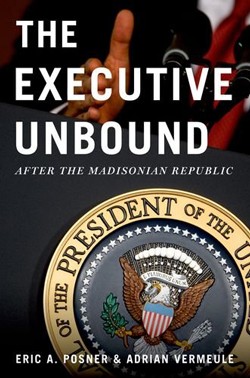April 7, 2011
Private: Liberalism and the Strong Executive
Executive Power BookTalk Debate

By University of Chicago law professor Eric Posner and Harvard law professor Adrian Vermeule. Read a response to this post by Ohio State University law professor Peter Shane here.
The great debate in the United States today concerns the size of the national government. Liberals and progressives want to preserve entitlements and raise taxes; conservatives want to cut entitlements and lower taxes. However, there has been little debate about the role of the president in the national government. Conservatives have complained about a few of President Obama’s executive actions — for example, his recent decision not to defend DOMA — but these complaints have been perfunctory. Liberals have complained that Obama has endorsed large swathes of the Bush administration’s counterterror policies and legal theories — the theory that we are at war with Al Qaida, the robust state secrecy privilege, the program of targeted killings, and limited procedural protections for suspected terrorists. But few liberal commentators argue anymore that the President is abusing executive power.
A few years ago, one might have predicted a different outcome. The intensity of the criticisms of Bush-era executive aggrandizement from liberals, joined by a handful of prominent libertarian conservatives, justified the expectation that once Democrats took power, they would cut back on presidential power, just as the Democratic Congress did in the years following the collapse of the Nixon administration. For even if Democrats trust Obama to use his powers wisely, they ought to plan for the day when a Democrat no longer occupies the presidency. That did not happen. Why not?
The answer is that although there remain critics of presidential power on the left and right, these critics do not have any following among the public or the elites. Americans of both parties want a strong president; their disagreements concern what he should do with his power.
Americans of all ideologies have learned that the president is the most effective officer in government, and thus they turn to him whenever they face large-scale problems. Today, conservatives look to the president to keep internal order (war on drugs) and to oppose external enemies (war on terror). Liberals look to the president to manage the economy and launch humanitarian interventions. One could imagine a political coalition in which the right gave up on security and the left gave up on economic regulation, so that institutionalization of a weak presidency would be supported by both sides of the political spectrum. But that has not happened, and has never really been a plausible outcome. Both sides want an effective government (whatever its size and political orientation), and believe that a system of executive primacy offers the best hope for it.
The Obama administration has been distinguished by the significance of its legislative achievements, which might at first sight suggest a reawakening of Congress. But Congress has followed, not led; and both the Dodd-Frank Act and the health care law delegate immense authority to regulators in the executive branch, following the century-old pattern that generated the current system of executive primacy.
A major puzzle is the continuing resonance of anti-President rhetoric, reflected in the constant comparisons of Presidents such as Bush and Obama to Hitler. The rhetoric seems to reflect a characteristic political strategy of trying to delegitimize one’s opponent without at the same time criticizing general constitutional structures. Americans somehow venerate the Constitution and especially the presidency while frequently regarding the current occupant of the presidency as a usurper. Hence the resonance of the charges that Obama is not an American and that Bush stole the election in 2000. This type of rhetoric harks back to a monarchical age when no one criticized the institution of monarchy but people would argue that bad kings were usurpers. In this roundabout way, the current anti-President rhetoric proves our point—in a system of executive primacy, it is natural for people to focus intensively on the character and pedigree of the occupant. The presidency is secure even if particular presidents are not.




